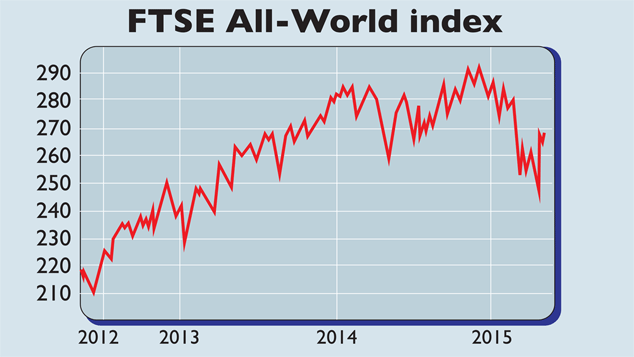
Global equity markets suffered their worst quarter in three years this summer. But the fourth quarter has got off to a strong start. The FTSE All-World index, which covers both emerging and developed markets, has bounced by around 10% this month. Can stocks keep going? This summer’s swoon was caused by the prospect of higher interest rates in the world’s biggest economy, America, and fears of a sharp downturn in China. But it now looks as though Chinese growth is due to bounce, while markets are not expecting the Federal Reserve to raise interest rates until March.
In the late summer, many investors had expected the Fed to move in September. But global jitters and some soft US data mean that dearer money has been postponed. That’s good news for stocks, as liquidity lifts asset markets. “The chatter among the cognoscenti,” says John Authers in the Financial Times, “is shifting from trying to guess the date of a rate rise to working out what new monetary measures might be available to the Fed to apply more stimulus.” Some are pencilling in a fourth round of quantitative easing (QE), or money printing.
It’s not just the Fed, notes Jesse Colombo on Forbes.com. The data from Europe have weakened recently and there is speculation that the European Central Bank could up the pace of its QE. The same applies to the Bank of Japan. So we’re back to the “Goldilocks scenario”, as Ralph Fogel of Fogel Neale puts it. Global growth is positive, but nowhere near strong enough to push central banks into tightening monetary policy.
However, markets may be too complacent. Core inflation is now at 1.9% in America, the highest since July 2014. “It is clear that underlying inflation pressures are at worst stable and in all likelihood drifting higher,” says Derek Halpenny of Bank of Tokyo-Mitsubishi UFJ. Meanwhile, earnings are set to dip in America, while elsewhere, too, “we are at that stage of the cycle when companies can no longer patch up earnings growth with cost-cutting, share buy-backs and other smoke and mirrors”, says Fidelity’s Tom Stevenson in The Sunday Telegraph. American stocks remain very expensive.
But for now, the mood is dovish, and as we’ve often pointed out, liquidity trumps fundamentals. We would continue to recommend sticking to the cheaper markets furthest away from monetary tightening: Europe and Japan.